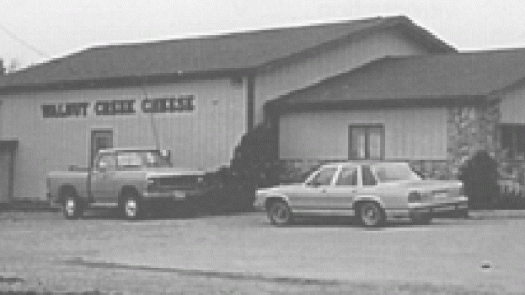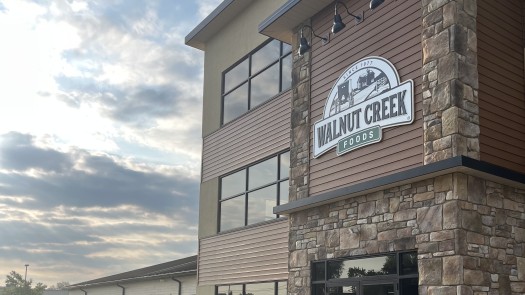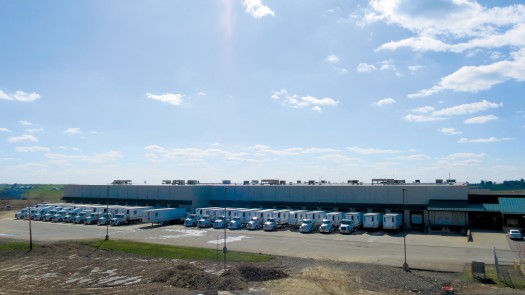by Mark Coblentz, President, Walnut Creek Cheese and Walnut Creek Foods
Young, enthusiastic, and a bit naïve. I had just moved home in 1977 after a stint as a volunteer in a church program, and my cousin told me about a cheese route started by a local fellow that was now for sale. I struck a deal that put me in business.
There was a little problem, though: The previous route owner neglected to tell me that he had quit the route a month before, and I happened to be the first (and only) fellow who came along offering to purchase it. The business really wasn’t much more than a pickup truck with a refrigerated box, an assortment of 20 local foods, and a list of about 60 potential customers.
Early on a Tuesday morning, I filled my truck with locally produced food products and headed for northeastern Ohio, peddling cheese and Trail Bologna to retail stores. My cheese experience at that time was limited to having tasted four varieties: Swiss, Baby Swiss, Longhorn, and occasionally a Casino Brick.
Anyway, I was excited when the first store ordered two wheels of Baby Swiss and three rings of Trail Bologna—about $15 worth of product. I calculated that if all the stores on my customer list purchased that amount, I’d be able to survive. The only problem was that the manager at the next store told me he didn’t need any of my products. An even greater disappointment came later that first day when I learned that the largest customer had traveled to Holmes County to buy product directly from the manufacturer because the previous route owner hadn’t shown up for nearly a month.
Even though I didn’t have the benefit of education or experience, I did have a significant advantage. That edge was that my parents had raised me with Christian values. My parents were conservative Amish Mennonite, and they had taught me the benefits of hard work, the wise guideline of going the extra mile, and the necessity of honesty. Education and experience then came day by day, customer by customer.
And even though it would be years before we put our mission statement and core values into specific, printed form, the same values we now claim as central to our business were guiding our fledgling company back then.
I treated my new customers the same way I wanted to be treated—with respect, demonstrated in delivery consistency and fair pricing. The large customer who shut the door on our possible business relationship the first day became one of my best customers after I showed up every week for six months. “You've earned my trust,” he told me. “I know you won't leave me high and dry.” His store has been a great customer for decades.
Another customer, appreciating my enthusiasm, took me under wing and helped me gain a number of new accounts. Because of these new clients’ requests, I realized that just 20 varieties of cheese weren’t meeting my customers’ needs. I began adding additional products. I figured since I was already delivering at a store, I could increase sales to a customer and save them money—practicing good stewardship for both my company and theirs.
My first warehouse was a couple of refrigerated truck beds and a shed on my dad’s farm. When more space was needed in 1984, we built our first warehouse in Walnut Creek, Ohio. We attached a retail store to the front, primarily to justify having personnel available to answer the phone for wholesale orders and pick-ups. Although the retail store began as an afterthought, it gave us exposure and product knowledge that was used to better serve our wholesale customers.
With both wholesale and retail in place, we turned our focus to manufacturing. My brother Jason and I formed Coblentz Chocolate Company in 1987, a venture which further piqued our interest in manufacturing more of our own foods. That led to the acquisition of Snyder Foods in 1994 and Holmes Distributing in 1995. Both of these companies manufactured several categories of food and had been friendly competitors in the wholesale trade.
These acquisitions involved all of our core values—respect, stewardship, and growth. We had gained their trust by trading with them in the same manner that we wanted to be treated. Customers who had been served by three different companies could now be served with one delivery. We were now three times the size we had been before—and our growth was not only in size. We realized we were not able to lead the company without also pursuing additional skills and insights.
These three core values have fueled our continued growth as we’ve seen numerous expansions and new buildings through the years. Today we have two retail stores, located in Walnut Creek and Berlin, which annually serve over 1 million people. Our wholesale operations deliver in 12 states, serving over 2,000 customers. All of this is possible because of the 350 associates we have at Walnut Creek Foods and Cheese. They are a great team to work with.
For more information on our company values, visit the Our Vision, Mission, and Values page.



